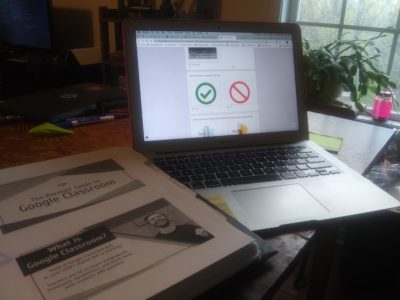
The U.S. Department of Education is not recommending that Congress waive any material provision of laws aimed at protecting students who learn differently.
As part of the third round of CARES Act funding, Congress asked Secretary of Education Betsy DeVos to make recommendations about waivers from such laws as the Individuals with Disabilities Education Act. On Monday evening, the DOE released an 18-page report saying that “there is no reason for Congress to waive any provision designed to keep students learning. With ingenuity, innovation and grit, I know this nation’s educators and schools can continue to faithfully educate every one of its students.”
The report did, however, recommend flexibilities on administrative requirements, such as timelines for evaluations and identification for services.
The department’s Office of Special Education Programs has not released any guidance in the wake of the DOE report. Locally, there are many questions for teachers and families of students with learning differences, including those in the state’s Exceptional Children Division and those with Individualized Education Plans or Section 504 plans.
How will DeVos’s report affect Exceptional Children in North Carolina?
“The DOE report does not change the EC Division’s approach to remote learning,” EC Division Director Sherry Thomas said in an email interview. “We will continue to support districts as they work to make distance learning available and accessible to all students, and therefore, special education services as needed for our students identified with a disability.”
When coronavirus shuttered school buildings, the Exceptional Children Division spent weeks vetting and compiling resources, ultimately unveiling a website of resources and guidance this month. Across the state, EC directors have been working with EC teachers in their area to move IEP meetings, specialized services and instruction to remote settings.
“The biggest victories are the outpouring of care and concern from teachers to their students and families,” Thomas said. “The efforts teachers are making to reach their students, establish regular communication and provide instruction is nothing less than amazing. They are finding new ways to reach students through instruction and not giving up when their first attempt doesn’t work. Teachers have been truly resilient during this time. The same goes for building administrators and district level staff. Everyone has tackled this with a can-do attitude.”
Will the State Board of Education request flexibilities with administrative requirements in federal laws on learning disability?
It might before its regular meeting on Wednesday, but that is not on the agenda for its special meeting today.
“We’re still digesting what was said, and we’ll want to get the full board’s input on what to do with respect to requesting flexibility,” Vice Chair Alan Duncan said in an interview. “Our big emphasis at the moment from an EC standpoint is to try to get the legislature to give us the $17.9 million that we’re requesting for Exceptional Children. We feel like that’s very important.”
That money is for extended summer services and future services, and will allow local education authorities to focus on providing catch-up services to EC kids before next school year – provided in-person instruction is deemed safe – and also continue services into the school year.
“There’s a large number of students who will need it in order to get them back to the skill levels they were at and then continue to refresh that and work on those skills,” Duncan said.
The $17.9 million will be enough to get services started in the summer, though Duncan said the State Board may need to request additional funds in the fall.
If the state does consider administrative flexibilities, what could that look like?
The Council of Administrators of Special Education (CASE) and the National Association of State Directors of Special Education (NASDSE), which have members among several of DPI’s EC Division and EC directors across the state, has publicly requested temporary and targeted flexibilities in implementing IDEA through three specific phases: timeliness, procedures and fiscal management.
“In no other situation in our organizations’ history can we find a time where we have asked for limited flexibilities in implementing the IDEA,” said an April 13, 2020, letter from CASE and NASDSE to members of Congress. “However, now more than ever, schools and states need to be focused on what is important — providing an appropriate, accessible, accommodated educational program to all students in light of their current circumstances.”
The letter outlines the three areas of requests.
Timeliness: “It is for this reason that timeline requirements should be paused from the day schools closed due to the pandemic and extended for not more than 45 school days after regular school year in-person instruction has resumed” for the following:
- 60-day initial evaluation timelines and re-evaluation triennial due dates
- Annual IEP review timelines
- Complaint timelines
- Early childhood transition from Part C to Part B
“LEAs have been and will continue to be unable to meet those timelines, due to stay at home orders, school building closures and impact of COVID-19 on families and school personnel,” Thomas said. “North Carolina has little flexibility, as we are required to ensure IDEA is upheld and implemented through the requirements of General Supervision.”
Procedural Flexibility:
- IEPs: “We, therefore, suggest that all IEPs written before schools closed be maintained. In situations where the current IEP does not sufficiently describe the services that are being provided during the pandemic, a separate document could be created, for example, in a ‘distance/continual learning plan.’ The plan should be clearly communicated after consultation with the parent. In addition, team meeting requirements should be flexible during the development of the documentation of the new plan. The development of the plan would maintain IEPs and placements to avoid a stay-put placement (in the home environment) under a due process complaint during this national crisis. No IEPs would need to be amended under this plan.”
- Data Collection and Corrective Action Plans: It is important that the standards set forth under the IDEA related to district and state performance plans be temporarily adjusted to provide the greatest flexibility possible. Items of concern include, but are not limited to, submission of Comprehensive Coordinated Early Intervening Services (CCEIS) data, the State Systemic Improvement Plan (SSIP), State Performance Plan (SPP)/Annual Performance Report (APR), and state monitoring and enforcement. We support the state and LEA focus on providing services to students, rather than diverting attention to corrective action or other paperwork.
Fiscal Management Flexibilities:
- We recommend MOE be waived for the 2019-2020 school year and that unspent CCEIS and proportionate share dollars are carried over to the 2020-2021 school year.
Without waivers from requirements, what will education look like for kids with learning differences?
The flexibilities CASE and NASDSE write about are, in some cases, mere formality. Whether flexibilities are granted or not, some timelines cannot be met and some procedures can’t be followed remotely. Without waivers, EC services will look much as they do now — EC teachers offering whatever services they can remotely, EC teachers working with parents to coach them on in-person instruction when possible, online and telephonic IEP meetings, and lots and lots of documentation for the services that EC kids just can’t get right now.
“The EC Division will continue to advocate for the health and safety of students, their families and school personnel first and foremost,” Thomas said. “LEAs will continue to deliver distance learning to the best of their abilities and meet the requirements of IDEA, including the implementation of IEPs and other related processes to the extent possible. If no flexibility is provided by Congress on these problematic timelines, the SEA will report data and ultimately be held responsible for non-compliant issues that are beyond anyone’s control during this pandemic.”
Compliance issues aside, Thomas said she has faith in EC teams across the state.
“… [G]uidance continues to change, based on federal and state directives,” she said. “The Division is working tirelessly to communicate and clarify as quickly as possible to provide guidance and support to our LEAs. We are in awe of the responsiveness, creativity, initiation and tireless dedication of teachers and related service providers, administrators and central office staff as they provide services to all students, but especially students with disabilities.”
Recommended reading



